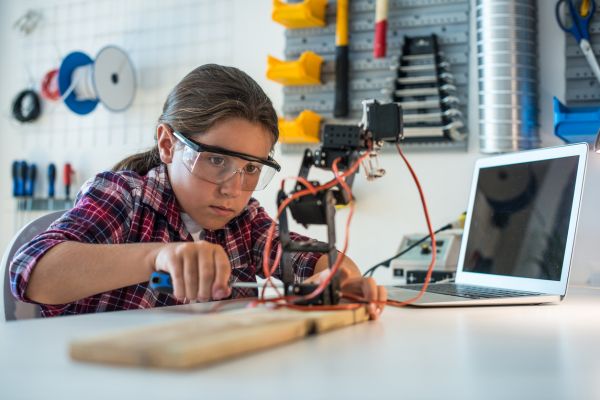indireinforma
Science Learning & Tinkering: a great combination of two Erasmus + projects

Tinkering is an educational approach which teaches “thinking with your hands”, that is learning by doing and experimenting with tools and materials. The method is very useful to introduce children and students to STEM subjects in a practical way, but has also proved to be effective in adult education, because it increases problem solving ability and abstract thinking, strengthens logical thinking and creativity, and encourages group collaboration in the achievement of a common goal. Two Erasmus+ projects, coordinated by the Museum of science and technology of Milan – one of the reference points for tinkering activities in Italy – are dedicated to tinkering, used as a method to promote scientific subjects education. The two European projects will be presented at Fair Didacta on 28 September by Maria Xanthoudaki, Director of the educational services of the museum.
Find below Maria Xanthoudak’s article for an anticipation of her speech at Didacta.
The National museum of science and technology “Leaonardo da Vinci” in Milan (MUST) coordinates two projects funded by Erasmus+ on tinkering, a cutting-edge approach in STEM (Science, Technology, Engineering, Mathematics) education and to develop 21st Centuries competencies.
“Tinkering: Contemporary Education for the Innovators of Tomorrow”
The first project, “Tinkering: Contemporary Education for the Innovators of Tomorrow” (started in 2014 and ending in 2017), sprang out of the need to answer global challenges by creating informed and aware citizens, able to think critically and be actively involved in the scientific and social debate. The project addresses this need investing in tinkering, an innovative educational method developed by San Francisco’s Exploratorium. The tinkering method promotes a simple concept: create things to understand what the world is made of. This is the core part of many activities which can be more or less complex. San Francisco’s Exploratorium was the special advisor of the European project and was responsible for the training of the institutions which have been part of the consortium. As well as the MUST, coordinator of the initiative, the partners of the project are Cambridge University (UK), Deutsches Museum (Germany), NEMO Science Museum (Netherlands), the Centre for Life (UK), the Mobilis Science Centre (Hungary) and Jedlik High School (Hungary). The main actions of the project have been planning, experimentation, implementation and dissemination of new tinkering activities for adults and secondary school students, together with the development of activities and tools for the training of tinkering educators in museums, and teachers. The project has involved some 12,500 adult learners and school students and 200 formal and informal educators. All the resources and activities of the project have been produced thanks to the partners’ cooperation, such as the “Guide for tinkering activities”, available, like all the other materials on the project website.
The activities developed and the resources produced aim at using tinkering for:
- Enhancing abilities and competencies related to STEM subjects
- Developing 21st Century competencies
- Promoting learner-centres approach in educational processes
- Spreading tinkering at European level in all the formal and informal educational contexts
- Exchanging experiences and expertise among the professionals operating in scientific museums and educational institutions.
Teaching STEM for inclusion: the project “Tinkering EU: Building Science Capital for ALL”
After testing the potential of tinkering in STEM education and in the development of competencies, also thanks to the previous project, it was deemed necessary to continue with a second Erasmus+ project, as the continuation of the first one. Therefore, the project “Tinkering EU: Building Science Capital for ALL“, continuing until 2020, has just been approved. Among the participants there are some of the institutions of the first project: MUST, the coordinator; Cambridge University and NEMO science Museum and also other institutions involved for the first time: Caixa Foundation (Spain); Science Gallery (Ireland); the scientific museums of Vienne (Austria); and the Noesis Science Museum (Greece). The Exploratorium plays again the role of special advisor and is in charge of the training of the project team. This project pushes in a new direction, that is the use of this method to develop a positive continued relationship between STEM and disadvantaged students. The project aims to improve scientific knowledge and competencies of young people, especially of those coming from disadvantaged backgrounds; develop creativity, entrepreneurship and critical thinking; support school education through a cutting-edge pedagogical method (tinkering); and encourage confrontation and cooperation between professionals and institutions operating in formal and informal education.
The project aims to address the following needs:
- The difficulty to establish a positive relation between science and the young, especially disadvantaged students, often experiencing social exclusion and difficulty in entering the job market;
- The need of contemporary society to form aware and competent citizens: the need to invest in the development of adequate competencies and adequate knowledge;
- The key role of museums in both promoting learner-centred educational approaches and in supporting social justice;
- The importance of promoting the concept of Science Capital as a store of personal scientific knowledge to build a positive relationship with science.
We intend to emphasise the importance of formal and informal learning through the EPALE platform and share the European reflections on museums as places for workshop activities and active learning for everyone, promoted by EPALE.
I’m going to present both the European projects at Fair Didacta, on 28 September during the workshop “A learning community for the development of adult competencies: The EPALE case study”
See you in Florence!
Article by Maria Xanthoudaki, Director for Educational services and international relations of the National museums of Science and technology of Milan “Leonardo da Vinci”
Follow the project on tweeter @TinkeringEU


